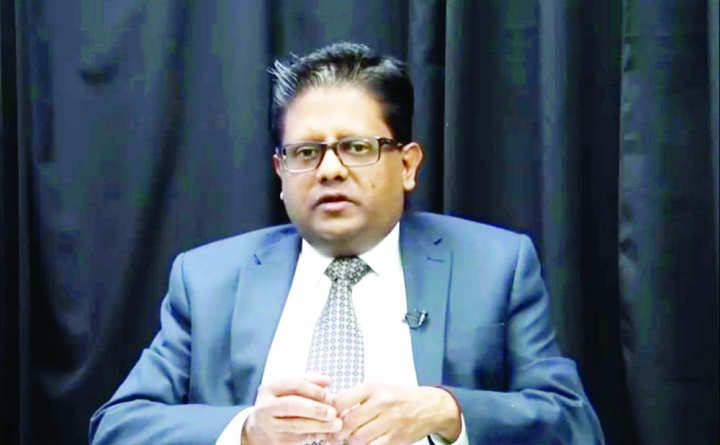Strategic plans to be initiated with Budget 2021
AFTER being elected to office on August 2, 2020, following a protracted electoral process, the new government was unable to implement and even initiate most of its plans because of limited time and other constraints, but 2021 will be no “missed opportunity” as the aim is to prepare a national budget, which outlines the medium and long-term plans for human, social and economic development. “Budget 2021 will outline the medium and long-term vision of our government, building on the manifesto, the basis for which we were elected by the people of Guyana,” said Senior Minister with responsibility for Finance in the Office of the President, Dr. Ashni Singh, during an exclusive interview with the Guyana Chronicle on Sunday.
The People’s Progressive Party/Civic (PPP/C)’s 2020-2025 manifesto has promised development across all sectors of the local economy. One of the key plans is the creation of 50,000 jobs in the next five years through initiatives such as improving the ease of doing business; providing incentives for small businesses and young entrepreneurs; reversing Value Added Tax (VAT) on exports, building materials, land rents, data and more; promoting skills training; improving access to financing for investments and incentivising employers to promote youth empowerment, among other measures.
Several of those promises have been fulfilled in the government’s emergency Budget 2020, but there are still key plans such as the creation of 10,000 house lots, the delivery of free tertiary education, and the expansion of Guyana’s infrastructure in the areas of transport, the utilities and sea and river defences, among other things which need to be realised.
The foundation for achieving those and other objectives has already being laid, but the more comprehensive strategies will be initiated with the passage of Budget 2021, which will be the first “full budget” of this administration. “We expect that the 2021 budget will have a strong medium and long-term orientation, so it will focus on the medium and long-term vision for the country. It will lay out our strategic priorities for the medium and longer term, initiating strategic interventions that would be critical to us realising the vision for the longer term,” said Dr. Singh.
This budget, according to the minister with responsibility for finance, will initiate a menu of strategic priorities and initiatives which are necessary to realising the government’s vision.
The vision is clear, but the road to development, at least in the short term, is not expected to be easy, as Guyana like the rest of the world is still grappling with the direct and indirect effects of the dreaded novel coronavirus (COVID-19) pandemic, which has infected over 71 million persons and killed over 1.6 million. Considering the crippling effects of the pandemic, there is need for a balance between protecting lives and maintaining economic stability. And while this is no easy task, the government has taken and plans to take further steps towards improving the economic situation. “The budget (Budget 2021) will have to take account of the reality that we are still operating in a somewhat challenging environment because of COVID-19…it is still with us and for this reason, we would have to take into account the fact that it is still here and the impact it will continue to have on the economy, until it is brought under control,” said Dr. Singh.
The emergency budget has already outlined some strategies and plans, which would initiate the recovery of the local economy and restore stability, but the reality is that the budget was only meant to guide Guyana through the remainder of this year.
The country, prior to the passage of the emergency budget, went more than eight months without a national budget because of a protracted electoral process, which ended on August 2, 2020.
The prolonged process had restricted the country from having a budget and, by extension, a clear plan for 2020. This was something the government worked on rectifying in just about 21 days after being sworn in. Crafting a national budget usually takes 179 days; however, extraordinary circumstances forced the government to condense the process and present one in 21 days. A $329.5 billion Emergency Budget was cleared by the National Assembly on September 25, 2020. The government has since been working to accomplish its plans outlined in this budget.
This budget includes a $25,000 cash transfer to every household; a $15,000 cash grant and a $4,000 uniform voucher for schoolchildren; $800 million for the Amerindian Development Fund; $5 billion for the Guyana Sugar Corporation (GuySuCo); a two-week, tax-free bonus for members of the Joint Services and $150 million for frontline workers, among many other benefits.
President Irfaan Ali had also said that the government, after re-prioritising and re-programming fiscal measures, has managed to add $20 billion in relief to the “pockets” of Guyanese at a time when the nation is faced with the effects of COVID-19, and the recently concluded protracted electoral process. The conduits of relief include revised tax measures and sweeping incentives.
The broad objectives of those measures which feature in government’s emergency budget are to stimulate economic activity; get persons back to work; increase Guyana’s productive capacity; reduce the cost of doing business; improve efficiency; and facilitate growth and development of businesses.






















